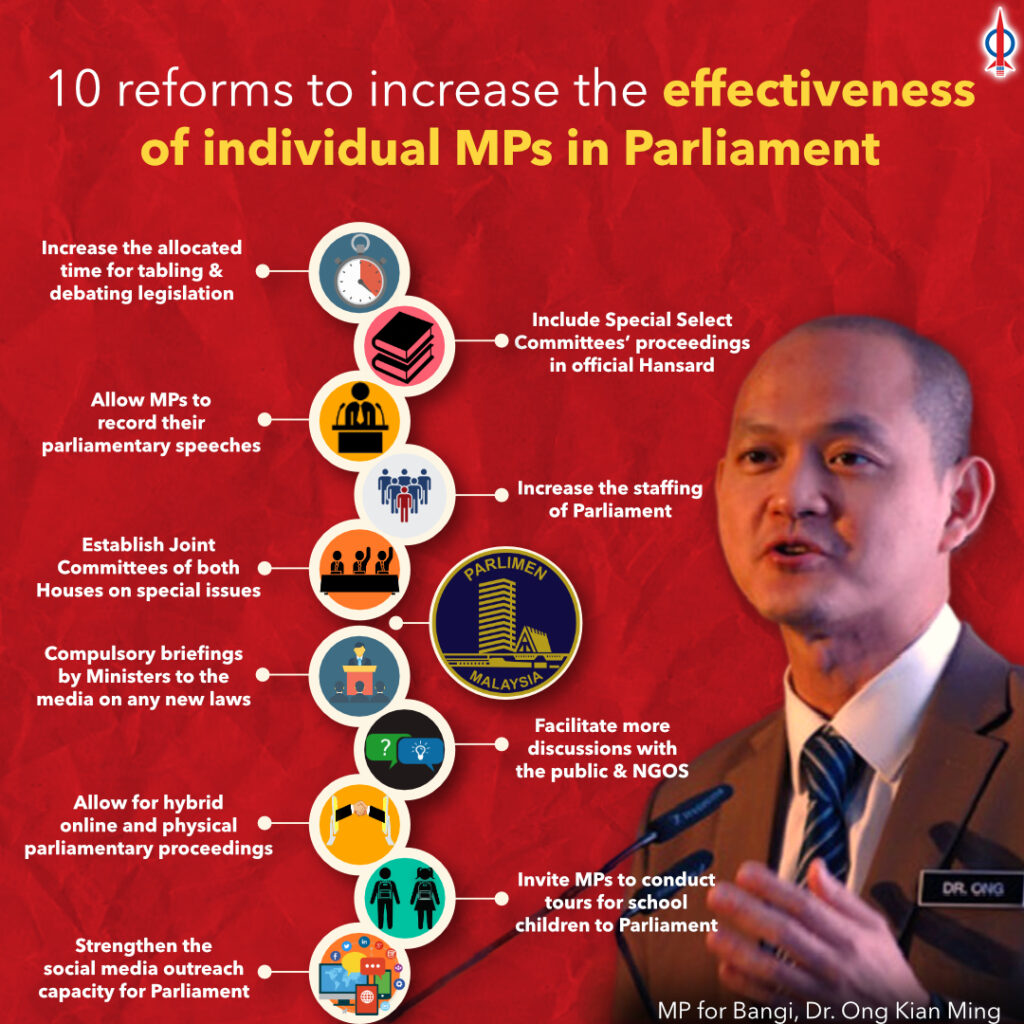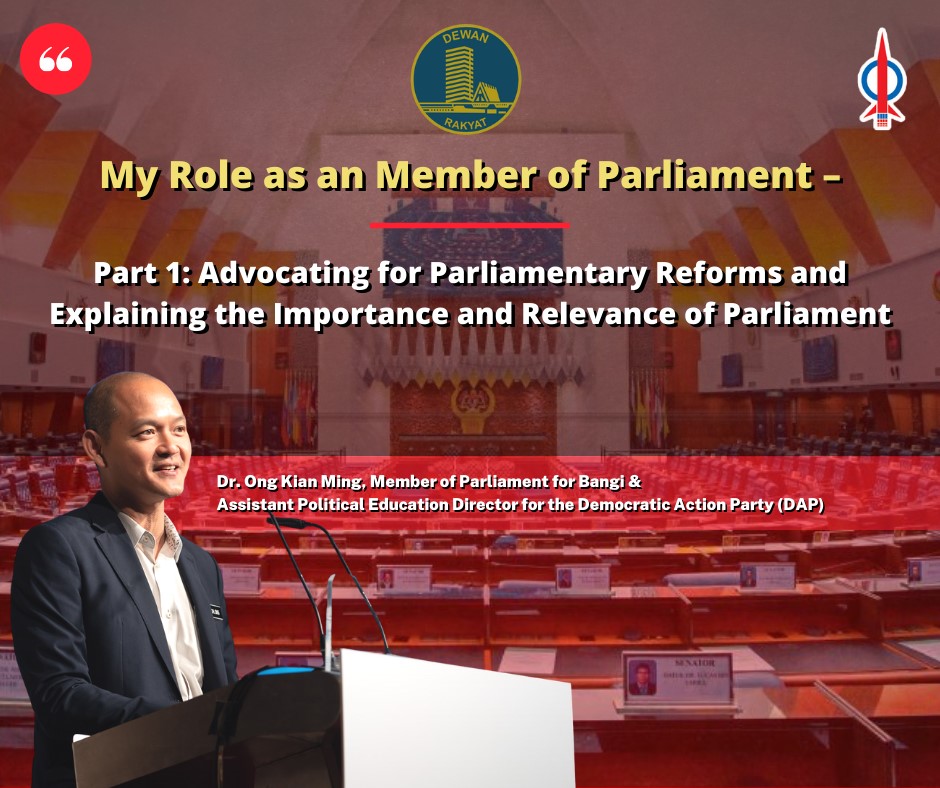
The Member of Parliament (MP) for Bangi, Dr. Ong Kian Ming in a statement today advocated for more Parliamentary reforms to be implemented so that the public could be made more aware of the Legislative body’s relevance and importance. The first of a series of posts titled ‘My Role as a Member of Parliament’, Dr. Ong, who is also the DAP Assistant Political Director shared that there is currently a lack of public communications in asserting the importance of parliamentary proceedings and the passing of legislations in the Dewan Rakyat and Dewan Negara.
He added that this lack of communication has resulted in an extremely low level of awareness among voters of the role and responsibilities of an MP in and outside of Parliament. Furthermore, the Bangi MP iterated that the public must be made aware of how Parliament can impact the lives of voters in Malaysia, for good and for bad, so that they can see more clearly the relevance of parliament and parliamentary proceedings.
Dr. Ong stressed,
“There needs to be further reforms to the parliamentary proceedings to increase the effectiveness of individual MPs in parliament,”
The DAP lawmaker then listed out a few Parliamentary reforms introduced during the 22-months Pakatan Harapan (PH) government rule which include:
- The introduction of the 2nd Chamber for the Dewan Rakyat to facilitate the answering of specific questions by a Minister or Deputy Minister.
- Making an Opposition MP the Chairman of the Public Accounts Committee (PAC).
- Making parliamentary replies to oral and written questions asked by MPs available online via the parliamentary website.
- A newfound spirit of discussion and participation where NGOs and members of civil society were invited to organise forums and discussion sessions with MPs and other stakeholders of parliament.
Sadly, a combination of the pandemic, the change in government post Sheraton move and the change in the Speaker and Deputy Speaker have brought these parliamentary reforms to a halt. However, such reforms were given a new life thanks to the historic Transformation and Political Stability MoU signed between PH and the Federal Government last month.
With the MoU, further parliamentary reforms were able to be agreed and put through for implementation, including:
- Half of the Parliamentary Special Select Committees will be chaired by Opposition MPs.
- The introduction of an additional Select Committee on Foreign Affairs.
- The composition of all Select Committees to have 5 from the government and 4 from the opposition bench.
- Equal funding for government and opposition MPs
- According the appropriate rights and privileges to the opposition leader
While all the above reforms are truly welcomed, Dr. Ong believes that further parliamentary reforms should be instigated. He then shared 10 specific proposals as per below:
1. Increase the allocated time for the tabling and debating of legislation
- The passing of legislation usually takes place towards the end of each parliamentary session leaving very little time for substantive debate. Sometimes, the passing of certain bills is postponed simply because there is not enough time to debate and pass them during the parliament session.
- There are many laws in the country which require amending and updating. A pipeline of these bills can be discussed and prioritized in a special parliamentary select committee and the order of government business needs to be changed so that the debate on these bills can be held earlier during a parliament session.
2. Allow MPs to record their parliamentary speeches and give more time for Ministers to answer the questions raised by MPs during their debates
- Currently, most of the time allocated in Parliament is for MPs to give their speeches either during the year end budget debate or when debating the Yang di-Pertuan Agong’s speech. Most MPs would read a prepared script. For example, 4 days would be allocated for the MPs to debate the King’s speech and only 2 days would be allocated for the Ministers to answer questions raised by the MPs with about 45 minutes allocated to each Minister.
- It would be a far better use of time for MPs to record their speeches which can be uploaded onto the parliament’s website which can then be shared through other social media platforms such as YouTube. The civil servants who are preparing the Ministerial responses can then refer to these recorded speeches.
- A limited number of MPs from both sides be allowed to speak from the floor of the Dewan Rakyat (5 from each side, let’s say) and each person can be given a longer time to debate and allow for interventions from fellow MPs.
- This will also “solve” the problem of MPs being absent from parliament (especially during the afternoon sessions) and provide more time for Ministers to answer the queries raised by individual MPs either from the floor or from their recorded speeches.
3. Increasing the staffing of Parliament to assist with the secretariat of individual Special Select Committees, the running of an expanded 2nd chamber, and the preparation of additional reports and public documents
- Currently, both Houses are understaffed, and this affects the proper functioning of the Special Select Committees in terms of preparing reports and finding suitable dates to invite the right people to attend these committee hearings.
- The number of staff can be added in conjunction with the introduction of a Parliamentary Services Act so that people who have a genuine interest in the functioning of parliament can be hired to fill the ranks of parliamentary staff.
4. All of the proceedings of the parliamentary Special Select Committees should be recorded as part of the official Hansard and shown “live” to the public
- This would allow the public to see that MPs are working in Parliament even if they are not seen in the Dewan Rakyat. Showing the proceedings “live” would also allow the public to gauge the performance of the members of these committees (especially the chair) and also the response of those who are called to give briefings to these committees (including and especially the senior civil servants).
5. Allow the establishment of Joint Committees of both Houses on special issues such as the one established to discuss Prison Reforms
- This was an initiative of Liew Chin Tong that is a genuine demonstration of what cross-partisan cooperation can achieve.
6. Compulsory Briefings by the Minister/Deputy Minister to the media and to the MPs on any new laws / amendments which are tabled (including on the record Q&A sessions for the media during these briefings)
- Right now, the only explanation given by the Minister / Deputy Minister for the introduction of new laws and amendments is in the Dewan Rakyat itself when these laws are being tabled.
- If briefings before the tabling of these laws can be given to journalists and Q&A sessions be allowed, it would increase the ability of journalists to explain the importance and perhaps, point out some of the shortcomings of these new laws. The Fourth Estate must be allowed to play its role.
7. Allow a hybrid system of online and physical parliamentary proceedings can take place (especially in light of the endemic nature of the COVID19 pandemic)
- This would also allow MPs who are travelling overseas or who have to attend certain constituency emergencies to continue to take part in parliamentary proceedings.
- This would require an amendment to the Standing Orders.
8. Encourage and facilitate more public, NGO and academic discussion on the role of Parliament and Parliamentarians
- Academic discourse and debate on the role of parliament and MPs is part and parcel of a healthy, functioning democracy. Although these efforts may not seem as important as debating bills or bringing up constituency matters, it matters in the larger ecosystem of the need of continual reforms and improvement to the parliamentary process.
- The Journal of the Malaysian Parliament was introduced earlier this year and it is a good start in terms of academic and parliamentary discourse.More opportunities for such discourses should be encouraged in parliament such as the ones which Bersih and other NGOs conducted in parliament when PH was in power.
9. Invite MPs to conduct tours for the school children who visit Parliament as part of a public outreach initiative
- Before Covid-19, school children used to visit parliament on a regular basis, and they would be invited to sit in the Dewan Rakyat for a short period of time to observe the parliamentary proceedings and debates.
- It would be a good “assignment” for MPs and even Ministers and Deputy Ministers to conduct parliament tours for school children (and other members of the public) on a rotation basis.
- It would be a good experience for the school children to be briefed by MPs on the importance of parliamentary proceedings. Who knows, this may even encourage better behaviour on the part of some MPs when they realise that school kids are paying attention to what they say and do in the Dewan!
10. Strengthen the social media outreach capacity of the Malaysian Parliament
- At the time of writing, @MYParlimen on Twitter has 14.4k followers, @parlimenmalaysia on Instagram has 69.7k followers, @parlimenMY on Facebook has 77k followers.
- All of these social media accounts have very low levels of public engagement. If we are to make parliament more relevant to the public, we need to showcase the proceedings which are happening in parliament.
- Of course, this must be done in a non-partisan manner. With a good social media team in place, I believe that this can be done, even in a fun way that makes parliament more easily understandable and accessible especially to the younger generation.
- Perhaps the social media team should take some guidance from Syed Saddiq, Hannah Yeoh, Fahmi Fadzil and Khairy Jamaluddin, who are among the most effective MPs at using social media?

As one of the three branches of government, these parliamentary reforms should be seriously considered in order to ensure the Legislative body can play its role effectively. Furthermore, through these reforms, the public can see more clearly the important role MPs play as the representative of the rakyat. – The Rocket.




